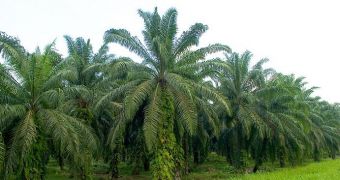Palm oil has been regarded as the best solution for obtaining an ideal biofuel: a cheap, renewable alternative to fossil fuels that would be also a solution for global warming.
Thus, energy companies converted generators and energy production from palm oil increased.
But new researches are increasingly pointing that: "As a biofuel, it's a failure."
That's the conclusion of a four-year research led by Marcel Silvius, a climate expert at Wetlands International in the Netherlands, that compared the benefits of palm oil to the ecological disaster from wiping out virgin Asian rain forests to grow lucrative new plantations.
This oil was for long a primary ingredient in food and cosmetics, but about five years ago, scientists started looking on it as a source of renewable energy, spurred by subsidies in many European Union countries and imports increased by 65 % since 2002.
Palm oil is attractive as it is relatively abundant, cheap (roughly $550 per ton), and needs few or no changes to already existing power stations.
Unlike fossil fuels, it was considered that the carbon emitted from palm oil's burning is equal to that absorbed during its growth.
But the cultivation of the palm trees was found to unleash far more carbon dioxide than will be saved by oil's burning.
The report investigated the carbon released from peat swamps in Indonesia and Malaysia that had been drained and burnt to make place for the palm oil trees.
Roughly 85 % of the world's palm oil is produced by the two countries, and about 25 % of Indonesia's plantations are on drained peat bogs.
600 million tons of carbon dioxide enters the atmosphere yearly from the drained swamps and another 1.4 billion tons is expelled while firing the rain forests to clear the ground for plantations.
The resulting smoke often shrouds Singapore and Malaysia in a dense fog for weeks at a time.
The CO2 expelled in the air for planting palm trees can represent up to 8 % of the world's fossil fuel emissions.
Experts said the research is astonishing, credible and reveals that harvesting palm oil for fuel is counterproductive.
"Deforestation is the No. 2 cause of greenhouse gas emissions after the burning of fossil fuels," said Jeffrey Dukes, a biologist at the University of Massachusetts.
"Clearing peat swamps for plantations is a double whammy. It not only releases carbon trapped over many millennia, but destroys the most efficient ecosystem on the planet for sucking carbon from the atmosphere," said Dukes.
Growing production of palm oil is "a terrible decision. Whether or not it's consciously made, it's society going in reverse," he said.
Major power companies are divided on the issue.
"Our company decided against palm oil after a year of study because it could not verify its supplies would be free of the taint of destroyed rain forest or peat bogs," said Leon Flexman, of RWE, Britain's largest electricity supplier.
The Dutch power company Essent announced in December it had ceased burning until it can verify the sources.
Biox, a Dutch startup, plans careful scrutiny of palm oil sources but will build three 50 megawatt power stations that employ palm oil byproducts exclusively, just enough to light all the homes in Amsterdam.
"From the start, we knew we can't stay in business if we can't prove that production is sustainable," said Biox executive Arjen Brinkmann.
"Until this report came out, peat lands was not an issue because we hadn't heard of it. Nobody had heard," he said.
Till now, the suspicions about palm oil have not influenced the market.
Production rose 6.6 % last year and will grow another 5.5 % this year to 37 million tons, while prices have risen 35 % in the last year.

 14 DAY TRIAL //
14 DAY TRIAL //